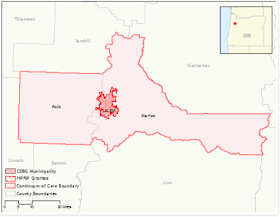Revised: 4 September 2019
By Sarah Owens and Michael Livingston
 |
| Should Marion/Polk Counties Leave or Remain in ROCC? |
History
 |
| OR-504, the Salem, Marion and Polk Counties CoC |
In response, CoCs were formed in seven Oregon communities: (in order of formation) Lane County; Multnomah County; Jackson County; Deschutes, Crook and Jefferson counties; Marion and Polk counties (map above); the 26 counties making up the Rural Oregon CoC or ROCC; Washington County; and Clackamas County.
In 2004, the City of Portland, Portland Housing Bureau (PHB), implemented a Homeless Management Information System (HMIS) for the Portland/Multnomah County CoC and contracted with Bowman Systems, LLC, to provide ServicePoint software (Oregon’s HMIS application) and services.
For several years, the Mid-Willamette Valley Community Action Agency (MWVCAA) administered the Marion and Polk Counties CoC. Besides MWVCAA, grantees included Shangri-La Corp., Northwest Human Services, Salem YWCA (which folded in 2013), The Salvation Army of Marion and Polk Counties, and the Salem Housing Authority. But, MWVCAA found CoC administration an increasing struggle, and, in 2011, the CoC's governing board decided to merge with ROCC. See "The 2011 Decision to Merge."
 |
| Oregon's CoCs prior to Salem/Marion, Polk Counties CoC merger with Balance of State CoC |
In 2011, ROCC was an unincorporated association of service providers that was receiving administrative support from the Oregon Housing and Community Services Department (OHCS). OHCS was ROCC's designated "Collaborative Applicant."
In 2012, HUD released an Interim Program Rule that codified the CoC structure and defined CoC responsibilities. OHCS entered into an inter-governmental agreement with PHB for the designation and transfer of rights to purchase and use ServicePoint licenses. PHB continues to own and operate the HMIS and to serve as the Primary System Administrator and custodian of the HMIS data, and OHCS continues to administer user licenses for ROCC.
In September 2012, OHCS notified ROCC that it would cease acting as its Collaborative Applicant,
leaving ROCC without administrative support. ROCC managed to survive, but its lack of organizational capacity made competing successfully for HUD CoC Program funding increasingly difficult, and its vast geographic area hindered its ability to coordinate services. In 2016, only two providers serving Marion and Polk counties were receiving CoC Program grants.
Homelessness rose to the top concern among Salem residents in 2016 (17%), 2017 (26%) and 2018 (33%).
Leave Initiative
On December 1, 2016, the Mid-Willamette Homeless Initiative Task Force approved a recommendation that Marion and Polk Counties “[a]ssess local inclusion in the Rural Oregon Continuum of Care.”
On February 21, 2017, the CANDO board considered the question, "Should Salem and Marion and Polk Counties begin planning to re-create a local continuum of care to plan and coordinate the effective delivery of local homeless housing and services, some of which are funded through HUD's CoC Program?" The board had received a letter from one of two CoC Program grantees expressing concerns about leaving the regional organization; however, after receiving a presentation from Jimmy Jones on the unique needs of the homeless in Salem and Marion and Polk counties, the CANDO board voted unanimously to support the commencement of leave planning.
As reported here, on April 16, 2017, the Affordable Housing, Homelessness and Social Services Work Group recommended that the City leave ROCC. However, over the next several months, the recommendation was put through the wash of the City Manager's Strategic Planning process and hung up to dry in the Mid-Willamette Homeless Initiative (MWHI) Steering Committee, who decided they needed a "cost-benefit analysis" before proceeding further. The committee made the CBA a priority in the Program Coordinator's one-year work plan, which was approved in April 2018 and amended in October. The amended plan called for a report on the CBA in November 2018, but the Program Coordinator quit before the work was completed. MWVCOG conducted a search for a replacement, and a new coordinator was expected to be on board by January 2019, but the recruitment was unsuccessful, so alternate arrangements were made to complete the CBA. See "Homeless Program Coordinator Position Empty, Iffy."
 |
| Portion of Original year-one work plan |
On March 28, the MWHI Steering Committee -- Tom Pessemier (Independence), Scott McClure (Monmouth), Kathy Clark (Keizer), Steve Powers (Salem), Colm Willis (Marion County) -- voted to recommend re-forming the Marion and Polk County CoC, possibly including Yamhill County. On April 24, the Polk County Board of Commissioners passed resolution 19-05, in support of forming a regional CoC. The Marion County BOC passed a similar resolution at its May 22 meeting, and the Salem City Council is expected to follow suit on June 10 with Resolution 2019-17.
The Yamhill County Board of Commissioners held two work sessions to consider joining Marion and Polk counties, ultimately deciding on May 21 against leaving the ROCC (Olson and Starrett voting against, Kulla voting in favor). See "Yamhill County to Remain in ROCC." Olson subsequently indicated a desire to seek reconsideration of the decision, but ultimately did not do so.
In June, the MWHI Steering Committee began finalizing plans to form the regional CoC Development Council that would ultimately replace the Committee. See "Area Leaders Forming CoC Development Council." The Committee met one last time on August 29, 2019, with plans to reconvene as an expanded Development Council on September 24.
Between September and December, the Development Council made final preparations needed to gain HUD's approval to split off from ROCC. That approval came through on December 11, 2019. See "HUD Clears Salem MSA to Leave ROCC."
To access all posts labeled "ROCC: Leave or Remain?", scroll to the bottom of this page to find "CANDO Archive issues" and click on "ROC: Leave or Remain."
No comments:
Post a Comment